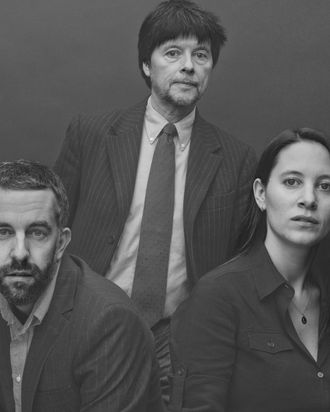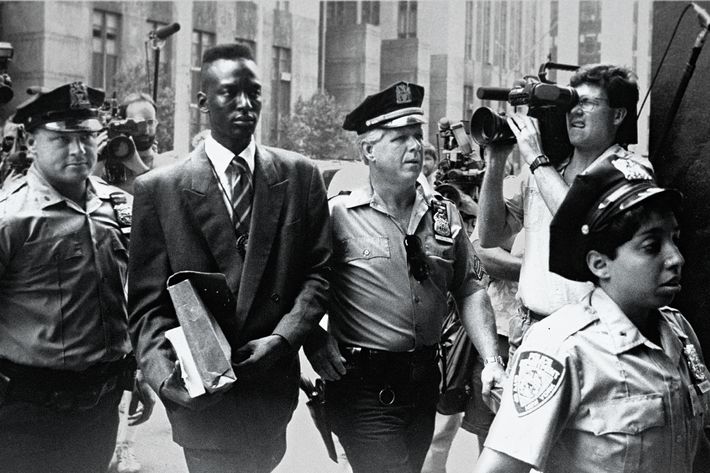
ÔÇ£TheyÔÇÖre so full of shit,ÔÇØ says Ken Burns, railing against lawyers for New York, the city thatÔÇÖs been the glamorous star of so many of his documentaries. ÔÇ£The outrage that I feel comes from the fact that people were readily willing to sacrifice the lives of five young men, that they were expendable, that theyÔÇÖre still stuck in a lie, and that the institutional protectionism continues.ÔÇØ
The master of languid still-photo pans and narration-heavy historical rambles seems to have metamorphosed into a firebrandÔÇöand not just in conversation. His new documentary, The Central Park Five, looks more like a Spike Lee joint or an Errol Morris expos├® than anything in the Burns wheelhouse. ItÔÇÖs about five Harlem teens convicted of the infamous 1989 rape of Central Park jogger Trisha Meili only on the basis of shaky confessions. Those convictions were vacated in 2002 after a serial rapist, whose DNA matched some found at the scene, came clean as the sole attackerÔÇöand after the Five had been jailed for years and permanently branded as emblems of urban decay. The movie alternates between grainy, jump-cut archival footage, searing interviews of the men, and ticktock deconstruction of their interrogations. There is minimal music and no narration. An Oscar contender with a limited release this week, Five recently became part of its own news cycle when city lawyers subpoenaed the outtakes for their defense of a civil suit filed by the five men.
Burns calls the movieÔÇÖs underlying subject, race, ÔÇ£the central operating premise of almost everything IÔÇÖve done,ÔÇØ but concedes some major departures. ÔÇ£It was entirely appropriate to let the story tell itself,ÔÇØ dispensing with narration. ItÔÇÖs also his shortest film in decades, his first theatrical release since 1985, and his first collaboration with the newest member of his team, his co-director and daughter, Sarah Burns.
It was her project from the start. Sarah met two of the Central Park Five back in 2003, when she was a Yale undergrad interning at a law firm that was preparing their civil case. Casting around for a ┬¡senior-thesis topic in American studies, she wound up with a 50-pager on the mediaÔÇÖs use of racial tropes in covering the case. Newspapers had coined the dubious term wilding to describe the ÔÇ£wolf packÔÇØ of 30-odd kids that had roamed the park that April night, beating and mugging passersby. (Other teens were convicted of lesser crimes; the Five were part of that group but probably not ringleaders.)
After graduation, Sarah went back to the law firm, and married one of her fatherÔÇÖs producers, David McMahon. Instead of applying to law school, she decided to turn her college paper into a book. One of her first readers, Dad, immediately wanted to turn it into a movie, in collaboration with his daughter and son-in-law. The three co-directors were well into the documentary by the time The Central Park Five: A Chronicle of City Wilding was published last year. All of them conducted interviews, Sarah did the research, McMahon handled the footage, and Ken lent his editing expertise.
They reasoned that a film, especially a Ken Burns production, could help drive home the menÔÇÖs innocenceÔÇöwhich ÔÇ£never got the attention that their guilt did,ÔÇØ as a historian puts it in the movie. One of their most difficult tasks was explaining how five different teens could have confessed to something they knew nothing about. ÔÇ£I had to understand for myself how it happened,ÔÇØ says Sarah, who lives with McMahon in Park Slope. ÔÇ£ItÔÇÖs the hardest part, in some ways, to wrap your head around.ÔÇØ The film details the tricks detectives usedÔÇödangling the promise of food, sleep, and home in return for concocted scenes in which the suspects claimed to be minor players, but pointed fingers at each other. ÔÇ£ItÔÇÖs amazingly similar in all these cases,ÔÇØ Sarah says, ÔÇ£the same sort of techniques that are really effective even when youÔÇÖre innocent.ÔÇØ
Just as important to the directors was restoring a little of the dignity that the Five had lost. ÔÇ£They were completely dehumanized,ÔÇØ Sarah says. ÔÇ£ItÔÇÖs really about letting people get to know them as individuals.ÔÇØ The Five develop, in the course of the film, as people with their own agency and personalities, their own strengths and scars. Gregarious Raymond Santana contrasts with closed-off Korey Wise, the only one tried as an adult. Yusef Salaam was the proud, sharp son of a Parsons professor, Kevin Richardson a mamaÔÇÖs boy in a house full of women. None of them were interchangeable members of a monolithic, violent underclass.

ÔÇ£We were considered animals,ÔÇØ Raymond Santana tells me, ÔÇ£and the movie lets people know that we were kids, just humans.ÔÇØ For the most publicly demonized men of Koch-era New York, it wasnÔÇÖt easy to speak again before cameras, as they had in 1989 after up to 30 hours of interrogation. Testifying to the Burns family was a reclamation of those induced confessions, a kind of storytelling jujitsu. They did it, in the end, not because of Ken BurnsÔÇöSantana ÔÇ£didnÔÇÖt even know who Ken Burns wasÔÇØÔÇöbut because of the trust Sarah Burns had fostered over the years. ÔÇ£We knew that she told the facts,ÔÇØ Santana says, ÔÇ£and thatÔÇÖs all we ever wanted.ÔÇØ
All the facts of that night may never be known. Meili remembers nothing of the attack and declined to be interviewed for Five; the rapist, Matias Reyes, currently serving 33 years to life for other crimes, initially agreed but backed out, standing by his confession as the sole attacker. Though the menÔÇÖs convictions were vacated, a report commissioned by Ray Kelly suggested the Five may still have had contact with Meili. But the report found no firm evidence for it, and it would contradict the pattern of ReyesÔÇÖs other rapes. In their civil suit, filed in 2003, the men are asking for $50 million each, charging misconduct on the part of detectives and prosecutors. The cityÔÇÖs defense rests not on the menÔÇÖs guilt but on the contention that officials and cops had probable cause for everything they did.
Active city officials refused to comment for the film, but city lawyer Celeste Koele┬¡veld tells me itÔÇÖs ÔÇ£unfair to suggest that either side is delayingÔÇØ the nine-year-old case. She denies that confessions were coerced or evidence was disregarded. Defending the subpoena against the Burns team, she argues that theyÔÇÖre advocates for a settlement and thus exempt from journalistic privilege. ÔÇ£If the plaintiffs truly want an open airing of facts,ÔÇØ she says, ÔÇ£they should encourage the filmmakers not to hide anything.ÔÇØ
ÔÇ£First of all,ÔÇØ Ken Burns responds, ÔÇ£the First Amendment permits you to have beliefs, and second of all, this is the most journalistic of my films. I think thereÔÇÖs one adjective in our film and thatÔÇÖs ÔÇÿbrutally rapedÔÇÖ ÔǪ TheyÔÇÖre just fishing for inconsistencies. This thirteen-year tragedy, which is justice denied, has been followed by ten years of justice delayed, which is also justice denied.ÔÇØ
Burns, whoÔÇÖs moved to quash the subpoena, says thereÔÇÖs further evidence of misconductÔÇöÔÇ£tangential information that ought to get somebody a Pulitzer somewhere.ÔÇØ It might even lead to another movie. His daughter isnÔÇÖt so sure: ÔÇ£I feel like I might have already spent too much time on this.ÔÇØ But the family isnÔÇÖt done collaborating. Though Burns has his hands full with solo ┬¡projectsÔÇöone on the Dust Bowl, currently airing, and a couple of forthcoming epics on the Vietnam War and the RooseveltsÔÇöthe group has already embarked on another co-production, a biography of Jackie Robinson.
Meanwhile, the civil case continues its endless slog. Burns is reluctant to speculate on whether his movie might influence a settlement. But Santana isnÔÇÖt so circumspect. ÔÇ£We want people to be enraged and do something, speak their voices,ÔÇØ he says. ÔÇ£Now, does that influence our civil case? IÔÇÖll take it if it does. In 1989, the media greatly impacted our case, and nobody questioned that. So when the tables turn, there shouldnÔÇÖt be too much complaining now.ÔÇØ┬á┬á┬á┬á┬á┬á┬á
The Central Park Five. Directed by Ken Burns, Sarah Burns, and David McMahon. IFC Films. NR.
*This article originally appeared in the November 26, 2012 issue of New York Magazine.

